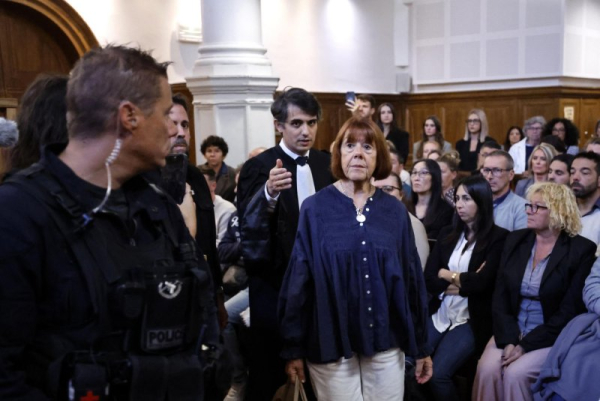

Gisele Pelicot, center, arrives in the courtroom of the Gard criminal court, in Nimes, France, Monday. An appeals trial involving one of the defendants convicted of raping her be heard by the court. Photo by Guillaume Horcajuelo/EPA
Gisele Pelicot, who endured a decade of rape by dozens of men while being drugged by her then-husband is back in court Monday as one of those men appeals his conviction.
Husamettin Dogan, 44, a builder who was sentenced to nine years in prison for raping Pelicot, has appealed his conviction and will be in court Monday. He’s the only man in the case to appeal.
Gisele Pelicot’s lawyer Antoine Camus said she would rather not face another trial, but said it was important to be there.
“She will be there to explain that a rape is a rape, that there is no such thing as a small rape,” Camus said
At his trial, Dogan said he met Dominique Pelicot in a chat room and drove to the couple’s home in June 2019. He was convicted of raping Gisele Pelicot while she was unconscious. He said he thought it was a game.
“I’m not a rapist; that’s too heavy for me to bear,” Dogan said.
Gisele Pelicot’s ex-husband, Dominique Pelicot, 72, was sentenced last year to 20 years in prison. He pleaded guilty to drugging and raping her for a decade. The 50 other men in the case were sentenced from three to 13 years in prison.
Dominique Pelicot drugged his wife by crushing up sleep and anti-anxiety medications into her drinks, ice cream or mashed potatoes. He then invited the men to come rape her, and filmed it all. He was caught when police caught him trying to film up women’s skirts in public, and they found the video files on his computer.
He is serving his time in solitary confinement and is expected to be at the appeal Monday.
Gisele Pelicot decided to go public with her identity to draw attention to rape culture issues in France, particularly drug-induced rape.
“It’s not for us to have shame, it’s for them,” she said in court.
The trial sparked outrage and protests among France’s women. Many were hopeful for change, but that change has come slowly.
“I would say changing behavior is something that takes generations. [But] the Pelicot case sparked a huge, historic mobilization … against sexual violence, and against impunity,” Alyssa Ahrabare, who coordinates a network of 50 feminist organisations in France, told the BBC. “We’re focused on training professionals, supporting victims, on investigations.”
In May, French actor Gerard Depardieu was convicted of sexually assaulting two women and was sentenced to 18 months suspended. He will also face trial in another sexual assault case.
Elodie Tuaillon-Hibon, a lawyer involved in prosecuting the Depardieu case, told the BBC that she’s not optimistic that things will change in France.
The Pelicot case “changed some things. But actually very little,” she said, comparing sexual violence in France to a “war waged against women and children every day.”
“We still have a great deal of changes to (make). Rape culture is something deeply rooted in our society. And until it’s taken into consideration seriously as a matter of public policy, it won’t change.”